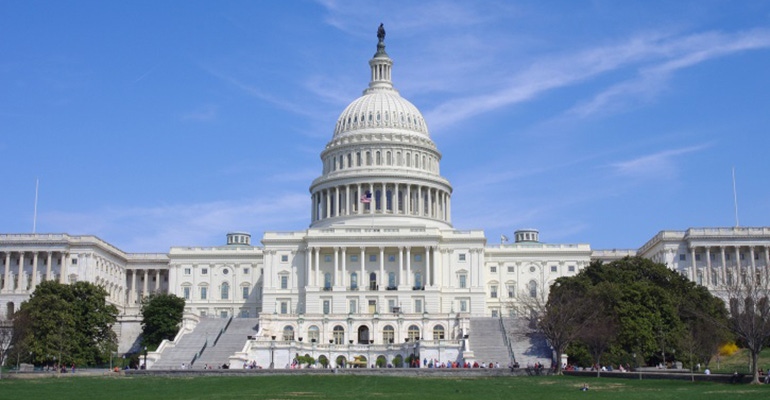Congress averts government shutdown
Legislative Watch: Congress averted a government shutdown by passing a short-term continuing resolution late yesterday.

Government Shutdown Averted - Congress passed a short-term continuing resolution to keep the federal governmment funded through February 18, 2022, thus avoiding a government shutdown. The curent continuing resolution (CR) was set to expire at midnight tonight, December 3.
House and Senate appropriators hope the new deadline gives them time to negotiate the 12 full-year funding bills for the fiscal year that began on October 1.
The CR continues the authorization for USDA’s Livestock Mandatory Reporting (LMR) program until February 18, 2022. The House and Senate Agriculture Committees hope to be able to reauthorize LMR early next year and not have to depend upon short-term extensions through the CR.
The next fiscal hurdle for Congress is to raise the debt ceiling by December 15.
Protect Meatpacking Workers Legislation - Senator Cory Booker (D-NJ) and Representative Ro Khanna (D-CA) have introduced the "Protecting America's Meatpacking Workers Act" which would provide stronger workplace protections for meat and poultry processing workers. In addition, the bill imposes requirements on companies seeking line speed waivers, reimposes country-of-origin labeling for beef and pork, and changes rules for packers buying and owning livestock.
Senator Booker said "We must end this era of abusive practices and begin to ensure that all workers, farmers, and ranchers have a safe and fair opportunity to earn a living. The Protecting America’s Meatpacking Workers Act would provide essential protections to meatpacking workers and is a critical piece in transforming our food system to one that is rooted in resilience, fairness, and justice."
Booker's press release said, the Protecting America’s Meatpacking Workers Act would do the following:
Protect meat and poultry works by:
Preventing the Secretary of Agriculture from issuing line speeds waivers unless meat and poultry plants agree to a USDA inspection which must show that an increase in line speeds will not adversely impact worker safety;
Establishing occupational safety and health standards to protect employees in meat and poultry plants;
Implementing a regional emphasis inspection program for meat and poultry plants which will cover multiple aspects of worker safety including amputation hazards, ergonomics, and hazards related to line speeds, bathroom breaks, use of certain antimicrobials, and temperatures of work sites;
Allowing meat or poultry plant employees the ability to authorize a representative, who may be a member of a worker-based community group, to accompany physical inspections;
Strengthening existing protections against retaliation from employers when employees refuse to perform work duties under conditions of reasonable apprehension and sets up a system wherein employees may file a complaint in the event retaliation has occurred;
Establishing a standardized, publicly available, reporting process for use during pandemics, which will require meat or poultry plants to report the number of employees who have become ill, their racial demographics, and their employment status;
Reform the farm system by:
Requiring that all grants funded under USDA AMS for Expanded Meat & Poultry Processing include labor peace agreements and prohibiting small processing plants that received a grant from being sold to meat and poultry packers with over 10 percent of market share for a period of 10 years;
Strengthening the Packers & Stockyards Act to crack down on the monopolistic practices of meatpackers and corporate integrators;
Restoring mandatory country-of-origin labeling requirements;
Calling for GAO reports that would explore:
The fragility of our nation’s food system with respect to meat and poultry;
Racial and ethnic disparities in meat and poultry processing;
The actions taken by the federal government in response to the COVID-19 pandemic to determine the effectiveness of those actions in protecting animal, food, and worker safety.
Organizations endorsing the bill include the AFL-CIO, Farm Aid, Friends of the Earth, R-CALF USA, and United Food and Commercial Workers International Union (UFCW).
Record AG Exports - Exports of U.S. agricultural products are projected to reach a record $175.5 billion in fiscal year 2022 according to USDAs latest forecast.
U.S. agricultural exports to China are forecast at a record $36.0 billion. China is expected to continue to be the largest export market for U.S. agriculture.
USDA's latest "Outlook for U.S. Agricultural Trade: November 2021" forecast included:
Agricultural exports - $175.5 billion
Agricultural imports - $165.0 billion
Livestock, poultry, and dairy exports - $38.5 billion
pork - $6.6 billion, as growth in China pork supply limits import demand
beef - $9.1 billion
poultry and poultry products - $6.6 billion
Grain and feed - $41.5 billion
Corn - $17.0 billion
Oilseed and products - $38.9 billion - record
Soybean - $28.4 billion
Wheat - $7.1 billion
Cotton - $7.3 billion
Ethanol - $2.9 billion - record
The top five export markets for U.S. agriculture are China, Canada, Mexico, Japan, and the European Union.
Defend the Blend - Bipartisan legislation, "Defend the Blend," was introduced that would prevent the EPA from reducing the minimum applicable volume biofuels once the Renewable Fuel Standard's Renewable Volume Obligation is final.
There have been rumors that the EPA is considering retroactively reducing the 2020 RVO levels before the 2021 and 2022 levels have been announced. This legislation would prevent this from taking place.
The legislation was introduced by Representatives Ashley Hinson (R-IA), Angie Craig (D-MN), Rodney Davis (R-IL), and Ron Kind (D-WI).
Those endorsing the bill include the American Farm Bureau, Growth Energy, POET, ADM, Renewable Fuel Association, National Corn Growers Association, National Biodiesel Board, Green Plains, and National Farmers Union.
Representative Brown Joins House AG Committee - Shontel Brown Joins House AG Committee - Representative Shontel Brown (D-OH) has been appointed to the House Agriculture Committee. Brown recently won a special election to take the place of Representative Marcia Fudge who is the Secretary of Housing and Urban Development.
ockorny Group
Washington, D.C.
About the Author(s)
You May Also Like



